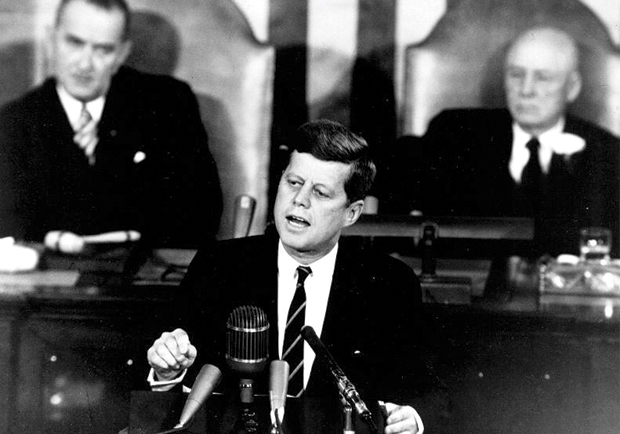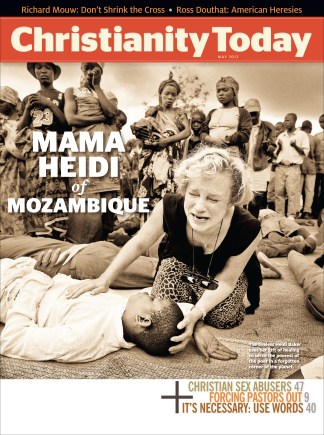Christianity Today was founded in 1956 to offset the influence of The Christian Century. In those days, we rarely agreed on anything. But in the run-up to the 1960 election, the two magazines warned Americans against electing a Roman Catholic President.
The Roman Catholic Church was not like "most denominations," CT's editors warned. If it were, "all Americans would welcome a qualified Roman Catholic citizen in the White House." But Roman Catholicism claimed "the State should officially recognize the Catholic religion as the religion of the Commonwealth … and should … sanction the laws of the church."
Those words from Pope Leo XIII provoked the same kind of reaction as talk of Shari'ah law does today. "Election of a Roman Catholic to the presidency … sooner or later would be a threat to our freedoms," said CT's editorial.
The candidate at issue was, of course, John Fitzgerald Kennedy, war hero, senator from Massachusetts, and scion of a politically connected Irish American family.
His election to the presidency in 1960 was by the narrowest margin since 1916. One key factor in his victory was a speech he gave to the Greater Houston Ministerial Association, assuring the ministers that fears of foreign and denominational influence on his policies were unfounded. Without those reassurances, no Catholic could have won the presidency.
Memories of that occasion emerged this year when former Senator Rick Santorum told a college audience that when he read JFK's speech he "almost threw up." Santorum told ABC News, "Kennedy for the first time articulated a vision saying, no, faith is not allowed in the public square …. What kind of country do we live in that says only people of non-faith can come in the public square and make their case?"
Unfortunately, Santorum significantly misread JFK's speech. Kennedy was not discussing the public square, but the presidency. He did not reject the participation of people of faith in the public debate, but the idea that ecclesiastical prelates could have back-channel influence on the President.
Let me offer several reasons why Catholic candidate Santorum should have welcomed what Kennedy accomplished in Houston.
First, Kennedy's speech was a key step in bringing American Catholics fully into their country's political and social life. Because the Vatican had indeed labeled the separation of church and state a heresy, and had done so in recent memory, Kennedy's opponents had reason to believe that Catholic prelates would try to shape American life by the force of law rather than by persuasion and example.
Kennedy put such fears to rest. As a result, politicians like Rick Santorum and Newt Gingrich have not had to consider their Catholic identity as political baggage. Six out of nine Supreme Court justices are now Catholics, and Protestants and Catholics work together on important social issues without fear of excessive church entanglement with government.
Second, Santorum should be glad that Kennedy did not support the secularization of politics; rather, he encouraged the privatization of religion.
Privatization means tying religion closely to family issues and personal concerns, while muting its voice on public policy. In modern, pluralistic democracies with great religious diversity, privatization allows us to show respect for the way faith plays out in the lives of others without undermining faith's role in our own lives. Privatization is one of the prices we pay for living together in peace.
But part of that price is that private issues are sidelined from public discourse. After Kennedy, religion played a less public role until the nation's bicentennial, when Jerry Falwell and Paul Weyrich launched the Moral Majority, dragging faith concerns back into the public discussion. In their noisy, bumptious way, they helped us realize that sexuality and education, for example, are not private but have a place in the public square.
Third, Kennedy's speech anticipated America's becoming an advocate for religious freedom on the global stage. He recognized that religious freedom was indivisible. If it belonged to any, it belonged to all.
JFK was almost 40 years ahead of his time when he said that "with respect to other countries, … I am wholly opposed to the State being used by any religious group, Catholic or Protestant, to compel, prohibit, or prosecute the free exercise of any other religion. And that goes for any persecution, at any time, by anyone, in any country." Finally, in 1998, Congress mandated that the State Department promote religious freedom globally.
What Kennedy probably should have said about faith in public discourse was clearly articulated by another "outsider" Democratic senator. In 2006, Barack Obama chastised fellow progressives who resisted religious talk in the policy debates. "Secularists are wrong," he told a Call to Renewal rally, "when they ask believers to leave their religion at the door before entering into the public square …. The majority of great reformers in American history … were not only motivated by faith, but repeatedly used religious language to argue for their cause." Any ban on "personal morality" in public debate he labeled "a practical absurdity." Our laws, he said, are "a codification of morality, much of it grounded in the Judeo-Christian tradition." Ironically, Rick Santorum would have to say amen to that.
Copyright © 2012 Christianity Today. Click for reprint information.
Related Elsewhere:
Previous Past Imperfect columns by David Neff include:
Why Last Saturday's Political Conclave of Evangelical Leaders Was Dangerous | Brothers and sisters, we are neither kingmakers nor powerbrokers. (January 18, 2012)
How the Physical Form of a Bible Shapes Us | Will the digital Scriptures speed the decline of family spirituality once fostered by family Bibles? (January 17, 2012)
Our Secret African Heritage | How we can remember our big family history. (November 23, 2011)
Criminalizing Circumcision | We have secularized the ancient Jewish rite—but it is still inescapably religious. (August 29, 2011)










